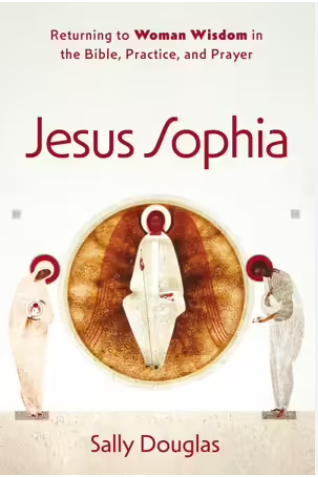Review: Jesus Sophia, Sally Douglas
Jesus may have been male, but God has no gender. Yet you wouldn’t necessarily know that from the language used in the churches. Of course, much of this language is derived from the way the Old Testament speaks of God, yet there is also feminine language for God there that has been neglected over centuries, in line with the church’s inclination towards patriarchy. In particular, the Old Testament uses feminine language to describe the figure of divine wisdom, in Greek named as Sophia, which the early church routinely applied to Jesus.
Melbourne Uniting Church minister Sally Douglas describes investigating the way the early church referred to Jesus’ divinity – which they did very early on – and how she noticed how many of these references used the language of Wisdom that occurred in the Old Testament. It seems the early church was familiar with the scriptures and therefore this feminine aspect of God, and readily understood Jesus being described this way.

The figure of divine wisdom is not like another member of the Trinity, but more like an important facet of God. She is the way of truth and justice. In Proverbs, she is described as being with God ‘before the beginning’. This echoes the beginning of John’s Gospel, of course, and we can see why the early church would then make associations with Jesus. Once we look at the way Sophia is described, we see many parallels. In Proverbs, she is described as truth, light and life, and as bread and wine. (The apocryphal book Sirach does the same.) In general, the language of Proverbs expands our view of God, in one allegory encouraging us to see God as a diligent mother who gets up before everyone else in order to care for her household.
Jesus himself refers to Sophia in Luke, and Luke assumes that readers will know what he’s talking about – there is no need to, unlike elsewhere in the Gospels, mention which older texts Jesus is making comparison with. In the Gospels, there are references to Sophia, the Wisdom of God, being a light in the darkness, and Sophia is spoken of in the language of communion, in both its wider and narrower senses. Importantly, this language, in linking to the Old Testament, is distinctly feminine.
This all may be strange to our modern sensibilities, but the early church and the church fathers were quite used to talking about Jesus in cross-gender metaphors. In 1 Peter we have the metaphor of Christians breastfeeding from Christ, itself a metaphor taken from Sophia. (Douglas mentions that this might be an alternative to talk of eating Christ’s flesh, which, somewhat understandably, was off-putting to the early church’s contemporaries.) Clement of Alexandria was quite happy to repeat and elaborate on this breastfeeding metaphor.
This re-emphasis on feminine language is not just an (interesting) academic exercise, a study of biblical linguistics. Douglas spends half her book explaining why embracing this feminine side of God is important for the church and for the lives of believers, and it’s not just due to modern political correctness.
Male imagery of God is pervasive and ingrained within the church, but this creates hierarchies within the church and alienates some. Outside the church, it can make God look like a cartoon figure – like Santa, Douglas says. Embracing feminine language for God, on the other hand, in conjunction with using male terms, is more inclusive, and more in line with the freeing message of the Gospel, of welcome and renewal and seeking the lost.
Jesus described himself (in Matthew 23) as a mother hen. Douglas emphasizes how the early church brought disparate people together in Jesus, insisting on their equality, and encouraging them to serve one another. This experience was transformational. Divine wisdom was seen as freeing, creating friendship and community, not free from pain but free from fear and unbelonging. Douglas sees herself how this can happen, in her work in an inner-city parish.
Further, she suggests that thinking of God in feminine, motherly terms helps in our interactions with the whole world, encouraging us to think in terms of nurture rather than battles. God knows we need this in times of fighting each other and dominating nature.
Nick Mattiske blogs on books at coburgreviewofbooks.wordpress.com and is the illustrator of Thoughts That Feel So Big.












